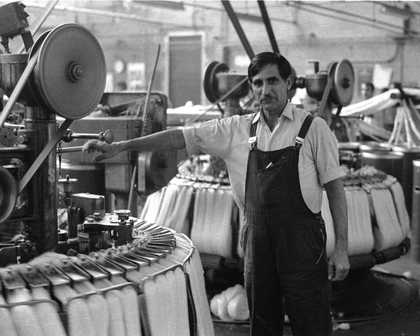This Tate Film Pioneers series is a rare opportunity to explore the breadth of New Zealand artist Darcy Lange’s socially-engaged film and video practice. Trained as a sculptor at Royal College of Art, Lange subsequently began working with video, creating remarkable studies of people at work that draw from conceptual art, documentary traditions and structuralist videomaking. Using film, photography and video – often shot simultaneously– he recorded people at work in English factories, mines and schools and in agricultural communities in New Zealand and Spain. Presented without commentary, his long, often unedited observations of workers aimed to convey the image of work ‘as work, as an occupation, as an activity, as creativity and as a time consumer’ and stressed the ‘responsibility to keep questioning the nature and power of realism’.
After an initial experimentation with the use of multiple lens media, Lange settled in video. In Work Studies in Schools, conducted in contrasted state and public schools in Birmingham and Oxfordshire in 1976–7, the observational studies of teachers in the classroom were extended by the videotaping of the teachers’ and pupils’ reactions to these recordings. Rather than engaging in the image’s process of signification through structuralism and semiotics, Lange grounded analysis in human experience and opted for the dialogic possibilities of video, inviting his subjects to speak about their own experiences of work and class. Enabling a situation where the exchange between teacher and pupils could be observed and analysed collectively, meant it could also be mutually redefined and transformed. Lange realised his expressed ‘socialist aspirations’ and transformed this project into ‘something very close to social activism’.
About Darcy Lange
Darcy Lange (1946–2005, New Zealand) established a career in the late 1960s as a sculptor producing large, hardedge abstract works, but soon turned to photography, film, and video. In 1971, he began videotaping and filming under the theme of ‘people at work’ in rural, industrial and educational contexts in Britain, New Zealand and Spain. In the late 1970s, Lange joined Maori activists’ struggles to establish land rights and developed his ambitious Maori Land Project (1977–80) during what became known as the Maori Renaissance, when bicultural policies in New Zealand fully came into place. Beginning in the 1980s, Lange became increasingly engaged in his music, he played flamenco guitar and created several multimedia performances involving music, poetry and art.
Lange’s video art is not widely known as his work became unavailable to audiences after the artist returned to New Zealand in 1984. A screening of Lange’s films and videos was presented concurrently with the exhibition Conceptual Art in Britain 1964–1979 and in the survey A Century of Artists’ Film in Britain in 2003, held both at Tate Britain. Lange’s series Work Studies in Schools was also the subject of a solo exhibition at Ikon Gallery in Birmingham in 2008.
Darcy Lange: Enduring Time is curated by Mercedes Vicente with Tate Film. The programme is supported by LUMA Foundation and Govett-Brewster Art Gallery.

